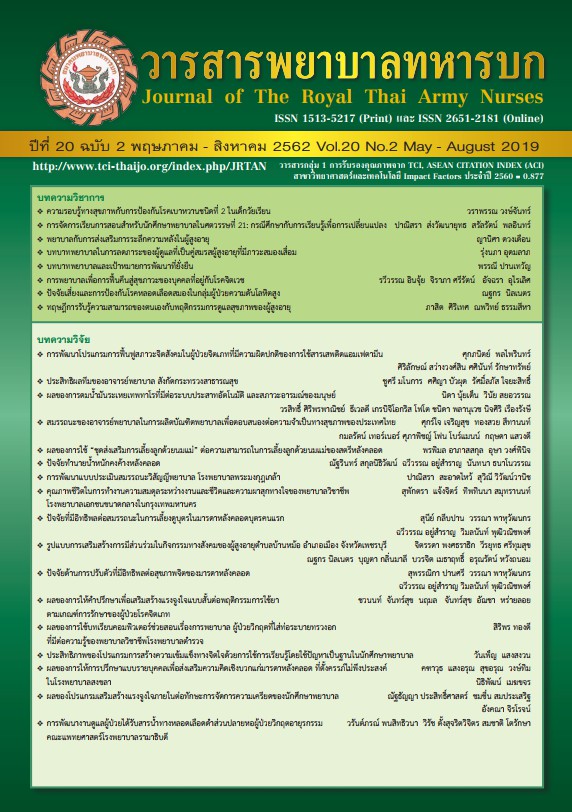Effect of chronic care model for slow progression of kidney in Tumbon Nongkhon Amphoe Meuang Ubonratchathani Province
Keywords:
Chronic care model, Chronic kidney disease, Slow progression of chronic kidney diseaseAbstract
This study used quasi-experimental research design, the one group pretest-posttest to examine the effect of chronic care model for slow progression of kidney in Tumbon Nongkhon Amphoe Meuang Ubonratchathani Province. The sample were 110 chronic disease patients, consist of DM, HT and CKD stage 1-3. Who came to receive treatment at Nongkhon subdistrict primary health care unit, Ubonratchathani province. The instruments consisted of 2 part, 1) Data collection included of the personal data record form, and knowledge evaluation questionnaire 2) self-care handbook and health record form. The statistics applied for analyzing data are frequency, percentage, mean, standard deviation, pair t-test and Wilcoxon matched-pairs signed ranks test.
The result of this study found that, The subjects significantly slow progression of kidney, had increasing of GFR and knowledgeable at the level of .01., the decrease of level of BUN and Creatinine after using the chronic care model at the level of .001.
It is recommended that the chronic care model should be future used as guidance for prevent and slow progression of kidney disease, Furthermore, applying the model for other chronic diseases for decrease co morbidity and severity of disease is also suggested.
Downloads
References
Dhanakijcharoen P. Current situation of chronic kidney disease in Thailand. Medical Journal; 2015:5-17.
Khaemnin S. Development of chronic kidney disease screening form in diabetic and hypertensive patients in Ho Kham subdistric, Bueng Kan District, Bueng Kan Province. An Independent Study Report for the Master of Nursing Science in Community health Nursing, Faculty of Nursing, Khon Kaen University; 2013.
Varitsakul R. Dietary management for slow progression in patients with diabetic kidney disease. Journal of The Royal Thai Army Nurses. 2014; 15(1): 22-28. (in Thai)
Jirubapa M. The Slowly Progressive Chronic Kidney Disease from Adult to Elder Persons. The Journal of Boromarajonani College of Nursing, Nakhonratchasima. 2014; 20(2): 5-16.
Tungsanga, K. Chronic kidney disease. In Eiam-Ong S, Eiam-Ong S, Praditpornsilpa K, Tiranathanagul K, Tungsanga, K, and Sitpreecha P, Editors Text Book of Nephrology. Bangkok: Text and journal publication; 2011 p. 1911 -24.
Supasin U. Food, nutrition and chronic kidney disease. In Eiam-Ong S, Eiam-Ong S, Praditpornsilpa K, Tiranathanagul K, Tungsanga, K, and Sitpreecha P, Editors Text Book of Nephrology. Bangkok: Text and journal publication; 2011 p. 1949 -60.
National kidney foundation of Thailand. Clinical Practice Recommendation for the Evaluation and Management of Chronic Kidney Disease in Adults 2015. Retrieved November 15, 2016
Wagner E H, Davis C, Schaefer J, Korff V, & Austin B. A survey of leading chronic disease management program: Are they consistent with the literature. Manag Care Q 1999; 7(3): 56-66.
National Kidney Foundation. K/DOQI Clinical Practice Guideline for chronic kidney disease: Evaluation, classification, and stratification. Retrieved June 15, 2016,
Srisatidnarakul B.The methodology in nursing research(4th edition). Bangkok: Chulalongkorn printing; 2010.
Siminerio LM, et al. Deploying the Chronic Care Model to Implement and Sustain Diabetes Self management Training Programs Diabetes Educ. 2006 Mar-Apr;32(2):253-60.
Khan MA, Evans AT, & Shah S. Caring for uninsured patients with diabetes: designing and evaluating a novel chronic care model for diabetes care. J Eval Clin Pract 2010; 16(4): 700-706.
Dauvrin M, Lorant V, d’Hoore W. Is the chronic care model integrated into research examining culturally competent interventions for ethnically diverse adults with type 2 diabetes mellitus? A review. Evaluation & the Health Professions. 2015; 38(4):435-63.
Tsai AC, Morton SC, Mangione CM, Keeler EB. A meta–analysis of interventions to improve care for chronic illnesses. AJMC. 2005;11(8): 478-88.
Stock S, Pitcavage JM, Simic D, Altin S, Graf C, Wen F, et al. Chronic care model strategies in the United States and Germany deliver patient centered, high-quality diabetes care. Health Affairs. 2014;33(9): 1540-8.
Luecha W, Benjawattananon S, K Pesee K, Rakmani P. The development of Diabetes care system in Chaiyaphum Hospital. The Journal of Nursing Division. 2011;38(1): 31-41.
Hatchai N. Effect of self-management program on self-management behavior among patients with diabetes mellitus type 2 and chronic kidney disease. An Independent Study Report for the Master of Nursing Science in Adult Nursing, Faculty of Nursing, Khon Kaen University; 2013.
Downloads
Published
How to Cite
Issue
Section
License
บทความหรือข้อคิดเห็นใดใดที่ปรากฏในวารสารพยาบาลทหารบกเป็นวรรณกรรมของผู้เขียน ซึ่งบรรณาธิการหรือสมาคมพยาบาลทหารบก ไม่จำเป็นต้องเห็นด้วย
บทความที่ได้รับการตีพิมพ์เป็นลิขสิทธิ์ของวารสารพยาบาลทหารบก
The ideas and opinions expressed in the Journal of The Royal Thai Army Nurses are those of the authors and not necessarily those
of the editor or Royal Thai Army Nurses Association.






